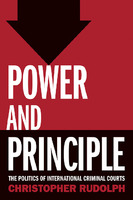Power and Principle
The Politics of International Criminal Courts
Author(s)
Rudolph, Christopher
Collection
Knowledge Unlatched (KU)Number
100415Language
EnglishAbstract
Human rights advocates have long pressed for international institutions to prosecute crimes against humanity. With its global reach and mandate to investigate and prosecute some of the world's most severe crimes (genocide, war crimes, and crimes against humanity) the creation of the International Criminal Court in 2002 was hailed as a landmark event in the evolution of truly global society. Supporters argue that the ICC and other transnational tribunals will deter the commission of atrocities and contribute to global peace and stability, and they laud its independence and its potential to check the arbitrary use of power against the powerless. To better understand how international criminal courts function and determine their broader implications for global society, this book examines the factors that led to the creation and evolution of international criminal courts, the nature of the support for and opposition to such institutions, and how they function.
Keywords
Political Science; genocide; war crimes; crimes against humanity; Cess; Human rights; International Criminal Court; Rome Statute of the International Criminal Court; United Nations; United Nations Security Council; United StatesDOI
10.26530/oapen_627441ISBN
9781501705526OCN
956775753Publisher
Cornell University PressPublisher website
https://www.cornellpress.cornell.edu/Publication date and place
Ithaca, NY, 2017-03-21Classification
International institutions


 Download
Download